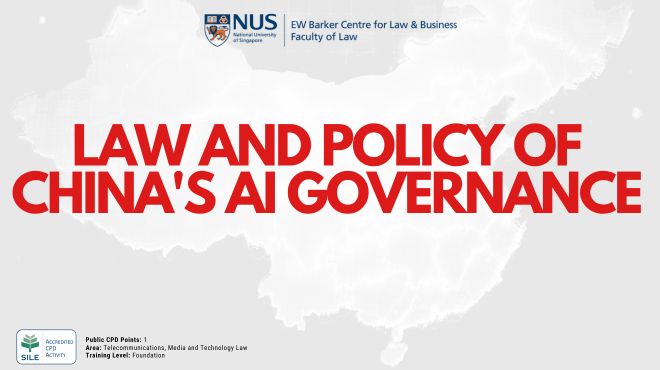Dr YOU Chuanman is currently heading the IIA Centre for Regulation and Global Governance, Chinese University of Hong Kong, Shenzhen campus. He is also an Adjunct Senior Research Fellow at the EW Barker Centre for Law & Business, NUS faculty of law. Prior to that, he had the privilege to pursue his academic passion in several institutions, including but not limited to, Singapore Management University, Tel Aviv University, University of Sussex and University of Hamburg. Dr. You‘s research expertise lies in Data and Platform Governance, M&A and Corporate Law, FinTech and Financial Regulation. His research results have appeared in high quality publication outlets, including Computer Law & Security Review, Capital Markets Law Journal, European Business Law Review, Company Lawyer, Business Law Review, Law Yearbook of China, Law Science (《法学》英文版), and etc.
Total Registrations: 51
Description
‘With great power comes great responsibility; absolute power corrupts absolutely.’
The rapid evolution of generative AI, akin to ChatGPT, has reignited a global fervour regarding the power and perils of the current wave of AI innovation, bolstered by big data analytics. Policymakers worldwide are increasingly focused on sustainable AI governance that can both promote technological innovation and provide safeguards for its widespread application. Achieving balanced AI governance, however, is a significant challenge due to the inherent complexities of the technology, which include high level of autonomy, efficiency and opacity. A case in point is the EU AI Act’s deliberations, widely praised as the world’s first comprehensive AI law fostering the development of ‘secure’, ‘trustworthy’, and ‘ethical’ AI.
This research presents a comparative and institutional analysis of law and policy regarding AI governance in China, encompassing the status quo, the political economy context, and future reform proposals. This analysis also sheds light on the conundrums of global AI governance amid escalating geopolitical competition. The first part contextualises AI innovation in China within the global landscape of technological development. It posits that while China may dominate in certain sectors, it lags in numerous aspects of foundational research in the race for global technology leadership. The second part delineates the key Chinese laws and policies related to AI governance, including the ‘Made in China 2025’, ‘Deep Synthesis Regulation’, and ‘Generative AI Regulation’. Its aim is to dissect China’s distinctive regulatory approach, such as its heavy reliance on a licensing scheme as a form of ex-ante regulation, and contrast it with practices in the EU and the US. The third part undertakes an institutional analysis of these unique regulatory measures, questioning how China’s AI governance system intertwines with the Party-State-Market triangle and how this interplay is influenced by institutional path dependency. The fourth section offers reform proposals to balance the multifaceted risks and benefits of this general-purpose technology within a conducive regulatory environment that promotes accountability, explainability, and inclusivity. The final section concludes with a future research agenda.
CPD Points
Public CPD Points: 1
Practice Area: Telecommunications, Media and Technology Law
Training Category: Foundation
Participants who wish to obtain CPD Points are reminded that they must comply strictly with the Attendance Policy set out in the CPD Guidelines. For this activity, this includes signing in on arrival and signing out at the conclusion of the activity in the manner required by the organiser, and not being absent from the entire activity for more than 15 minutes. Participants who do not comply with the Attendance Policy will not be able to obtain CPD Points for attending the activity. Please refer to www.sileCPDcentre.sg for more information.
TERMS AND CONDITIONS
1. Fees are to be paid before the commencement of the event with exception of e-invoices.
2. Fees paid are non-refundable.
3. Registration is transferable within the same organisation if the request is made at least one week in advance of the event.
4. By filling up this Registration Form,
i. Participants agree and consent that their personal data provided in this form may be collected, used, processed and disclosed by NUS and the event organisers for the purposes of processing their registration, in accordance with the Personal Data Protection Act 2012 and all subsidiary legislation related thereto. In respect to disclosure, NUS may disclose participants personal data to third parties (which may be in or outside of Singapore) where necessary for such purposes.
ii. Participants will also consent to NUS taking photographs and videos for the purposes of event reporting, marketing, publicity, and media/social media. Participants further consent to NUS disclosing such photographs and videos to third party media entities (whether in Singapore or otherwise) for publicity purposes and NUS may identify them by name.
iii. NUS Law School and designated event organisers reserve the right to alter any of the programme or other arrangements for this event, including cancellation or postponement of the event, should circumstances so warrant.
Date and Time
Wednesday, 6th September 2023 4:00PM GMT+08:00
to
Wednesday, 6th September 2023 5:15PM GMT+08:00
Organisation
Faculty of Law
Contact Email
ewbclb@nus.edu.sg
Location
Seminar Room 4-1 (Block B Level 4), NUS Bukit Timah Campus, 469 Bukit Timah Road
Our Event Speakers
You Chuanman
Schedule
- 06/09/2023 15:30Registration
- 06/09/2023 16:00Presentation by Dr You Chuanman
- 06/09/2023 17:00Q&A moderated by Associate Professor Lin Lin
- 06/09/2023 17:15End





